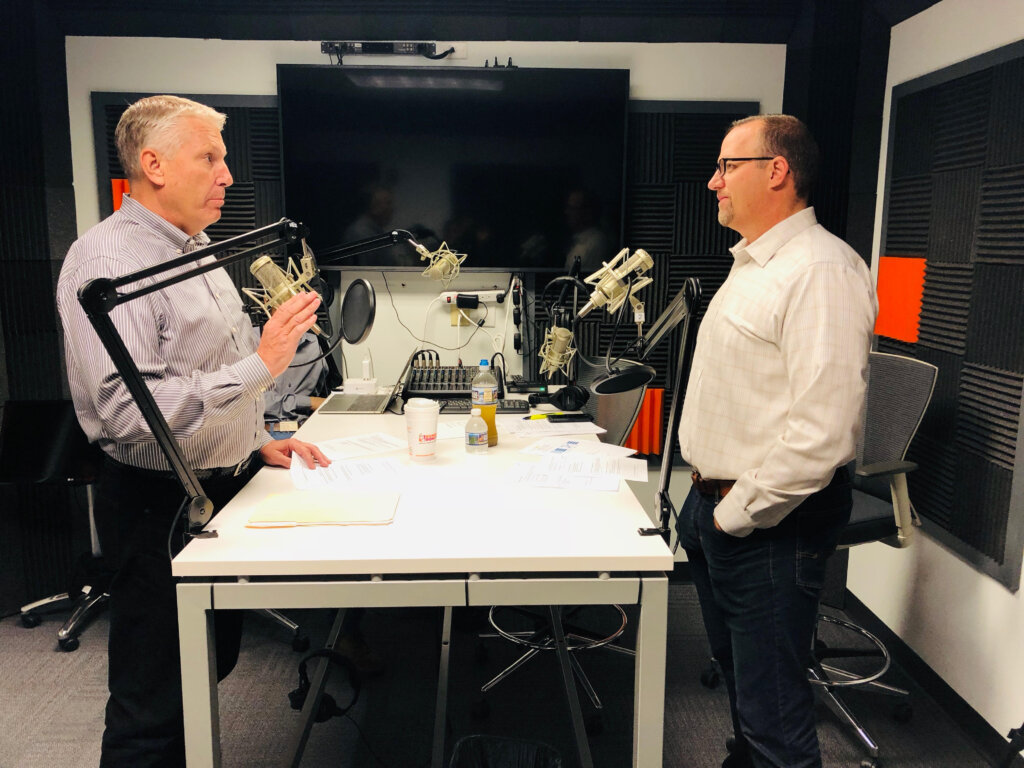Maxwell Executive Leadership Podcast #30: Leading Day to Day

It’s so easy to get caught up in today’s fast-paced world, that we often forget the most important part of being a leader: helping our team members reach their full potential. As leaders, it’s our responsibility not only to produce in and through our teams, but also to invest in each person and help them grow. In Episode #30 of our Executive Leadership Podcast, Chris Goede and Perry Holley share real examples of how great leaders lead day to day.
For more tips on leading day to day, sign up for one of our upcoming 5 Levels of Leadership Workshops in Dallas and Atlanta.
Listen to all podcasts in this series and subscribe to new episodes on iTunes– or Google Play.
Read the transcript below:
Welcome to the John Maxwell Company Executive Leadership Podcast where our goal is to help you increase your level of influence, increase your reputation as a leader, and increase your ability to fully engage your team to drive remarkable results. Hi, I’m Perry Holley, a John Maxwell facilitator and coach and I’m Chris Goede, Vice President of The John Maxwell Company. Welcome and thank you for joining.
Today’s topic is titled Leading Day to Day: The Next Level. This is an important topic. I think all of us, you know, sometimes just pull our hair out saying what in the world, how are we going to lead yet another day or what’s it going to be like to lead today? And this is a true Level 3 when we talk about the 5 Levels of Influence, right? The foundation of everything that we do, the methodology, this is about Level 3. And, so we have to drive production through our team, through ourselves and through our team. And, so really, we want to give you some keys today about what does this look like to lead day to day.
Yeah. And I think it’s really easy for leaders to get caught up in the day to day, the fast-paced world and the day to day urgencies that crowd the calendars that we forget that it’s a big part of leading the team and the individuals that make up the team is about helping each person reach their potential. I’m really fascinated by this, you know, how do you as a leader help people reach their potential? It’s really a day to day endeavor. Well, once you have the privilege and the opportunity to be a leader and the organization, you know, it looks at you and says, man, listen, I want you to lead this initiative to lead this group. You have to understand that you go from an individual contributor to being able to produce in and through teams.
And this is where that shift of how much time do you really spend on the EQ side of things versus the IQ side of things. Because when you begin leading people, to your point, right? We have to invest in the other people. We have to help the other people. We have to do whatever that is in order for the team to kind of to move up together. And, we’re in the people business. Once you move from, you know, being an individual contributor to leading a team or a movement or whatever it is, we are in the people. It doesn’t matter what industry, it doesn’t matter. We’re in the people business.
Well, one of the greatest lessons I ever learned was from a really high level executive. I worked for. I hate to admit that he almost drove me to quit. He pushed me, he challenged me. If I said it was blue, he’d say it was teal. I mean, every assignment I brought, it was never enough. He always had something to say about it. And day after day I just struggled with it. And, I came home, I told my wife and said, I think I’m going to quit. She goes, well, what’s wrong? I said, well, nothing’s ever good enough. He’s not rude. He’s not mean. He’s not disrespectful. But he never just says, Perry, great job. He always says, Perry, let me tell you, let me ask you a few questions. He always had something to say and my wife listened and she’s very wise and she looked at me and she said, you know, it sounds like he’s trying to make you better.
I went, oh, he’s trying to make me better. I’d never worked for someone that desperately wanted to help me grow. Everybody else just kind of a stamped you on the head and passed you along and this guy was, he wanted to see me at a higher level. Six months later he announced his retirement and I was about ready to cry. I said, how do you go from quitting to crying in six months? I’ll tell you what makes a difference is somebody investing in you and really saying I think you can do more.
Yeah. I think that should have been our title today, Perry. I think we should have said, how do you go from quitting the crying in six months? While you were sharing that story, for me, I think back of growing up and going through some of my experiences working for different leaders on sports teams and I think about some of the greatest coaches that I now call great coaches and I just go, yeah, no, I don’t think I would have said they were great at the time. But you look at now, hindsight is always 20, 20. Even just recently, you know, watching the Superbowl and thinking about Bill Belichick and the perception that he has, but yet to really truly know that the people that have moved on from their organization now what they say about their time, I think all of us have that. And so it’s good for us to keep that perspective. It’s a great lesson for us to just remember.
My biggest takeaway when you were talking about that, was, well, there’s no doubt the reason why he pushed you. The reason why my coach pushed me, the reason why sometimes we push our team members is that he saw something in you. We see oftentimes, don’t we see greater and others and they see it themselves and so it’s our job to pull that out. So there’s no doubt he saw something in you is why he’s pushing you.
Yes, that’s for sure. And I’m a little embarrassed that I didn’t see it then. I mean, I was so used to people not pushing me that I, you know, depended on pushing myself. But this guy wasn’t really going to let me sit back in the shadows, especially in his shadow and just do the minimum or even just run fire to fire. He was communicating to me that he believed in me. And I think that’s a real key for people that you want to build potential in others, is seeing them and then believing in them. Like you said, looking back, it really means a lot to me. I miss him today because of how rare that is, is that I really want, and then I’ll have to ask yourself the question, am I doing that?
That’s right. So remember we’re focusing on here, right? Is what does this look like to lead day to day? What are some of the things while we’re in the trenches that you can kind of work into what you’re doing instead of just kind of, you know, putting something else on your to do list? When you talked about belief, you know, oftentimes, isn’t it true that we have the opportunity, we’re probably privileged for a promotion or a job or a title that maybe we don’t have that skill set for. I surely know that we didn’t believe in ourselves when it came to, could we accomplish that? But we had other people that believed in us and gave us an opportunity that allowed us to grow.
Kind of staying in the same line right here on belief. I was just reminded of a story and I’ll share it. It’s in the sports realm, as well. My son is privileged to be a highly recruited, tight end coming out of high school. And I don’t talk about it a lot, but this belief story is really powerful and just want to share it so maybe you guys can just take something from this and speak this language into your team of belief. He was going from, I think maybe the 9th to the 10th grade and he’s getting a lot of national interest and all that stuff. And I said, okay, so it’s time for us to like get on some campuses and go to some camps. And so I took a week off during the summer and, we live in Atlanta, which you know, we can have access to all the SEC schools within a couple of hours, ACC schools. And so I said, hey, let’s plan a week. Let’s tie it around some summer camps and let’s just go get some exposure to some of these SEC schools that are showing some interest. So we started in Athens and, yeah, that’s right. Well, it’s why I felt comfortable sharing this because I know where your loyalty lies.
And so we started over in Athens and we went over there. He did his thing, performed well, connected and all kinds of good stuff. And so we came back home and we were getting ready, we’re packing up, getting ready for the little run of the other five schools. And, I got a phone call, then we connected with coach Kirby Smart, it was his first year there. And so he wanted to talk to my son and so he did and he offered him right there on the phone, a full scholarship, you know, going and so Dad’s over in the corner crying. Yes. Right. I’m going to buy that car. Yeah, that’s right. That’s right. No college bill. And he’s just so excited, you know, and he’s a dog fan. Grew up in Atlanta, obviously, but Kirby told him something he said, but I have one requirement and that is that you don’t post this on social media. And so telling a teenage kid that is like taking away their oxygen. Right. Right? So he said, okay, yeah, no problem. He said, you can tell family members. So we told family we were all excited and he said, now listen, I know where you’re going the rest of this week. And so on your way back home Friday from Knoxville. And I was like, wow, they really know what’s going on with these kids and these recruits. They know everything about him. He said, I want you to call me, I want to talk to you about how the week went.
And so he said, okay, yes sir. And, I said, good answer. And so we did the run. We went, you know, I think it was Clemson, Auburn, Florida, Florida State, Alabama. And then we ended up in Knoxville. Okay. It was crazy. We a lot of fun for Dad and for me to experience that with him. And so we’re driving back from Knoxville. He had a great week performed just like he did at Georgia, at every other school. All the head coaches has talked to us, you know, hey, we like what we see, all kinds of stuff. We’re going to be following you. We see you as part of our family, but no other offers. And so we literally are driving home from Knoxville and we get Kirby on the phone and my son’s in the back seat talking to him and he puts him on speaker phone.
And so what’s happening here in this car is Mama is with us on this, on this part of the trip and she’s in the front seat crying cause she thinks her son’s about to go to college in two days. You know, he still has three years at home and I’m like, oh man, this is some good leadership stuff right here. And so Kirby begins to speak to him about why he wouldn’t let him post it on social media. He said, because if you had done that, every school you had visited after us would have done the same thing. But what I wanted you to know is that my belief in you as a football player, as a tight end to be able to play in the SEC to be able to contribute on Saturdays and Athens, all the stuff was far greater than any other coach out there.
Like, I’m getting goosebumps just listening to the story again, that was three years ago. And so I sat there thinking about how this applies to culture and deleting people and I’m like, if this coach can speak that type of belief into — at that time — a 15-year-old where he was ready to jump out of the car going 85 miles an hour and he would have survived. If he can do that, my son still remembers that to this day. We just enrolled him and I promise you this, he will give that guy everything he’s got and never will he if he’s not playing or he’s struggling and that’s going to happen, will he go, man, my coach must not believe in me. It’ll never happen. He knows where his beliefs stands. So long story. But I wanted to share that with you because it really tied into as leaders, what type of belief are we speaking into our people? Are we speaking belief on a day to day basis to where we’re getting that extra effort that from our team members that we need to ,be doing. And, and to, to wrap this up real quick, right? Your example, this example here, belief really what what you’re doing is you’re setting high expectations that your team knows you believe in them and they’re going to go after that. So thanks for letting me share that.
That’s a fantastic story and that renews my faith that I’m at the right school. Go dogs. One thing I noticed years later, it probably has to do with what you’re doing reflecting back on that. But when I became a senior leader and my tendency was to have those high expectations so I could get more done and get more financial return. His motive that the executive in my life seemed to be more about his high expectation was to grow me and grow others on the team so that we could then generate high financial returns. It was a little bit of a play with words there, but it was more personal. It was about me and then what I could contribute to the organization to get to our goals versus him getting to his goal. So that makes sense? Yeah, absolutely. It’s the distinction between motivating and growing you versus manipulating you. Right. We talked about a fine line when it comes to influence and the fact that you have the privilege to influence people, you need to take that highly, you need to understand that there is a difference between, you know, motivating and manipulating and there is a distinct line and you need to kind of know what’s behind that. And so for me, what it sounds like even this guy that’s kind of pushing you is that not only did he have that belief and those expectations, but he was coaching you along the way, right? He’s giving you that continuous feedback on your performance. And what I love about the fact that he was kind of doing that to you and pushing you is that it was real time. It wasn’t, hey, I’m going to wait six months or 12 months and then we’re going to talk about kind of where you’re at and give you, it was real time and continuous, which allowed you to continue to grow and to improve.
Yeah. And getting the feedback, the way he gave it that was a little tough. I never had had a leader that would push me to be better. And so, I didn’t really know what he was doing. I would just encourage you on that are listening today is that seek out feedback, you know, desiring yourself to want to be better. And for the people that you give feedback to, you might let them know, it’s really the help them be better that you’re, you want them to grow as it’d be great for the organization then personally for the team. All of this are all kinds of great benefits, but, I’m glad my wife was there to keep me from going off the rails.
Yeah, that’s often the case with me as well. Coming back to this idea real quick, just kind of wrapping this thought up, you know, we need to make sure that we have proper motives. We need to be asking ourselves, you know, why are we leading people? Why are we doing what we doing, what we’re doing? And we need to make sure that it is the proper motive, that it is for growing and for leading and developing our people. Which in turn, by the way, is going to get you results, right? It’s going to get you that you’re going to be developing people who are going be producing. It’s going to but that Level 3 kind of credibility. What am I doing to help them get better?
I was in a meeting, just maybe two weeks ago with Carly Fiorini and we’re in partnership or talks of partnering with them on several different things. She and John are a aligned and get very passionate about leadership, about culture, about values. And so we’re talking about doing some things that maybe futuristically we’ll announce here about even some content around organizational training and production. She said a couple of things in there that kind of resonated right here about talking about what the motives are and it’s our job as leaders to get people better than I thought I’d share with you. She said two or three things I thought were really important. She said, a leader understands that their job is to unlock the potential in others.
That’s our job, right? We have to figure them out. That’s part of it. And then we have to figure out how do we unlock the great potential that’s inside of it? Somebody figured it out for us and somebody may be doing that for you right now, as well. She also said this is, this is powerful for me. The most important quality of a leader is the ability to see the possibility, not only of the organization, but she went on and talk about of the individuals on the team. And so we need to be thinking like that on a day to day basis.
Yeah. Well, I’ll just, the one final thought about the learning experience for me and kind of along what you’re saying, that he saw the possibilities and he was willing to invest, but it would have been a little bit lost on me if I didn’t also notice that he was also a great example. He didn’t ask me to do something he wasn’t willing to do. He wasn’t just pushing me. He was pushing himself. He would actually share mistakes he had made and corrections he had made. He would seek input from others. He would ask for a point of view or from other aspects of the business. He would provide insights he was learning from his coach. Heck, I never even had a leader who had a coach before. I thought this guy was humble and approachable, but he was he really was putting himself through the same thing. So maybe he had somebody putting him through it and his coach was maybe, but, he wasn’t asking me to do something he wasn’t doing, too. So yeah.
You know, that may even be that example, right? There may even be why you do what you do today, right in partnership with us and the John Maxwell Company is coaching people, right? You saw the impact that it had on your leader and now you’re on the other side, coaching leaders around the world so that they have a better impact on people. And so when you said that man, coaching is such an essential part of leading other people. You need to have a different perspective. Speaking into you, I’m helping you develop action plans and holding you accountable and different things that allow you to leave your team better on a day to day basis. That’s a huge part of our business. And I know you and I could probably speak to the testimonies after testimonies of the impact of people’s ability to lead, that our coaching through the 5 Levels has had on them. So anyway, sounds like he was teachable and approachable, which is awesome.
Let me just kind of summarize and then I’ll let you kind of wrap us up here. Well, we’ve talked about today, I think there’s probably two things that I would just bring back to our attention. Just remember that people have potential that are on your team right now that probably, no, not probably, I know that they don’t have access to it right now. They’re not using it. They’re not giving you everything that they have because they don’t know that. And that’s your responsibility as a leader to pull that out in order to help them do their jobs. And then the final thought is, just remember, as leaders, man, we’re in such a unique position. It’s a privilege to be able to help people and to see the potential in them. And oftentimes we are the one holding the key. And so as Carly, you know, reference just a little bit, she said, man, it’s our responsibility to see the possibility in each of our team members.
Well, it’s a huge engagement tool to highly engage your team if you are working to develop them, pull them into that potential that they may not know they have. And I know it changed the way I see my role as a leader and how I lead my team or my division or my company. I need to be always leading with an eye on developing that potential in others. It just always pays off in doing that. So great conversation. Thank you Chris.
Just as a reminder, if you would like to learn more about the 5 Levels of Leadership or perhaps bring a 5 Levels of Leadership Workshop to your organization, please go to JohnMaxwellCompany.com/podcasts. We would also welcome any questions or thoughts you may have about leadership on that site that Perry and I will be able to answer in future podcasts for you. Thank you for joining us. This has been the John Maxwell Company Executive Leadership Podcast.












Be the first to comment on "Maxwell Executive Leadership Podcast #30: Leading Day to Day"